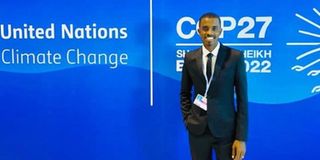Tanzanian appointed to UN advisory committee

Mr Ghaamid Abdulbasat. PHOTO | COURTESY
What you need to know:
- As a member of the IAC, Mr Ghaamid will contribute to the development of capacity-building programmes aimed at strengthening the implementation of the Nagoya Protocol
Dar es Salaam. The United Nations has appointed Mr Ghaamid Abdulbasat, a member of the International Advisory Committee (IAC), on behalf of young people in Africa and the world to implement the Nagoya Protocol of the United Nations Convention on Biodiversity and Environment, The Citizen has learnt.
A statement, released by the Secretariat on Biological Diversity of the United Nations Environment Programme, which was made available to The Citizen yesterday, shows that, as a member of the IAC, Mr Ghaamid will contribute to the development of capacity-building programmes aimed at strengthening the implementation of the Nagoya Protocol.
In force since October 2014, the Nagoya Protocol is a supplementary agreement to the Convention on Biological Diversity (CBD). It seeks to achieve a fair and equitable sharing of benefits arising from the utilisation of genetic resources.
According to the statement, through the appointment, Mr Abdulbasat will be responsible for strengthening the implementation of the agreement after the launch of the biodiversity policy framework in December 2022 in Canada at the fifteenth session of the Conference of the Parties (COP15), where Tanzania is also a member. Mr Ghaamid is among the ambassadors on the environment in the Vice President’s Office and is the Director of the Tanzania Biodiversity Organisation (@tzbioorg).
He has also received various awards, including the United Nations awards for motivating, involving, and teaching young people about the conservation and protection of the environment since 2017.





